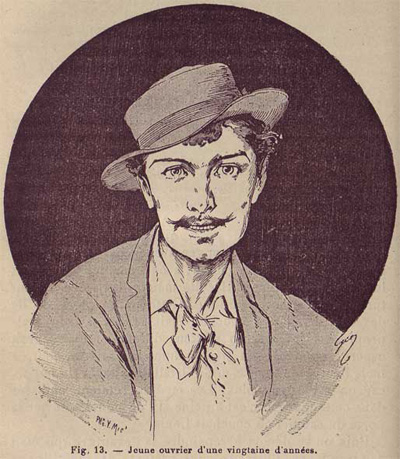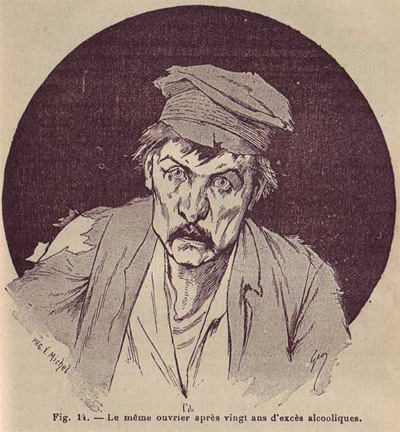Eugen Weber, France: Fin de Siècle -- Nervous Disorders
The higher social classes, or at least their sensitive offspring,
Before and After Images of the Supposed Effect of Drinking Absinthe |
knew that tender nerves were evidence of refined sensibilities. Baudelaire had admired the nervousness of Edgar Allan Poe's writing and the nervous intensity of Wagner's music. Baudelaire's admirers venerated the poet's "glorious nervous complaint that would affect all sensitive souls after him"; they sought, like him, to "exasperate their ailment." Félicien Rops, the great etcher, claimed to work with his nerves. Maurice Rollinat's poems Les Névroses date from 1883. For Zola, the work of the Goncourt brothers was "a sort of vast neurosis"; and Taine "fits well in our society of nerves." Edmond de Goncourt considered Degas a neurotic. Huysmans' Art Modeme (1883) described Berthe Morisot as a nervous colorist, Guillemet as "a packet of nerves under control," and Gauguin as "a skin beneath which the nerves vibrate," while Mary Cassatt offers "a whirl of feminine nerves transposed into her paintings."19
This stress on nerves and search for sources of nervous energy went hand in hand with a sense of enervation, loss of enthusiasm, lassitude, énervement d'esprit, a general degradation of energy apparently confirmed by the theory of entropy, derived from the second law of thermodynamics. But not only energy seeped away. Health and strength did so too, witness France's miserable performance in the demographic stakes. From the 1880s to the First World War countless voices rose to warn that the country was in danger of disappearing. And, as its numbers shrank, those who were left rotted from the inside.
The hold of the Church had weakened, but the wages of sin, to be paid not in the next world but in this, were no less terrible for guilty and innocent alike. Oppressed, exploited, the people struck back through its womenfolk who transmitted syphilis to bourgeois males. Picked up in the street, the brothel, or the maid's room, their corruption would necessarily affect the "race." The belief that vice carries its own punishment through venereal disease that rots its carrier and his descendants joined with vulgarized Darwinism to suggest that, like families, societies and social groups were subject to degeneration. "The degeneration of the race," Andre Derain wrote to his friend Vlaminck, "pours out of our every pore . . . We are the mushrooms of ancient dunghills."20
In the French version offered by Antoine's avant-garde theater, Ibsen's Ghosts spoke no longer about the hereditary effects of syphilis but those of alcoholism.21 But the vice or alcohol that sapped the ruling classes, depraved and brutalized the lower. If the race ran to seed, the result was further corruption: physical degeneration made for crime; digénéréscence and criminalitéwere linked in title after title, as in Zola's saga of the Rougon-Macquart clan. And before long a logical conclusion was drawn: modern man was going against the principle of the survival of the fittest. Some of the very institutions that an advanced society creates cause the decline of the race. Modern man looks after the weak, the backward, the degenerate. Public assistance, asylums, clinics, and hospitals keep people alive--idiots, imbeciles--to breed other degenerates whose survival contributes to the social disaster. Such counter selection should cease: criminals, degenerates, and mental defectives should be sterilized--freely or, if need be, "by fraternal pressure." Else, how can society be preserved?22

